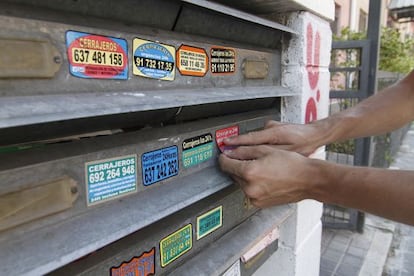Locksmiths’ union complains about pirate operators’ Madrid stick-ups
Illegal advertising and inflated charges threaten livelihood of license-holders

Slow and silent. Thus has been the advance of those little stickers advertising emergency locksmiths on the streets of Madrid. Mailboxes, apartment entrances, water pipes, windows and even sidewalks have been filling up with these low-key but persistent ads that benefit people like Tony, one of the hundreds of locksmiths who serve the capital. On his desk, just behind the machine that makes key copies, there are four telephones. They are ringing off the hook with calls from people who have been locked out of their homes. "I've already told you the technician is on his way, please wait," he tells one of his clients. There is a city map that takes up an entire wall; small Post-It notes signal the buildings where it is no longer necessary to leave any more stickers.
The instructions are clear. "You leave five stickers on the roll-up blinds of business premises, three on the mailboxes, two on the garages and a see-through one on the glass of entrance doors," explains this young locksmith to the "sticker guy" he's hired to cover a new neighborhood. "It is best to do it at night or very early in the morning," he advises. Then he pulls out a roll of stickers in six different designs from a locker. Although they all show different phone numbers, they lead to the same switchboard. "We never remove the competition's stickers. We always find some room for our own," he adds.
According to the city of Madrid, fines for posting unauthorized stickers (or signs, labels and so on) range from 750 to 3,000 euros. In the last three years, there have been 297 proceedings in connection with illegal advertising found on building walls, monuments, public worksites, urban furniture and streetlamps. Around 55 percent were initiated this year. "The greatest difficulty is identifying the guilty parties," notes a city official.
Five hours of work leaving stickers around town pays 20 euros, or 180 euros for the streets within the triangle formed by Avenida de América, Príncipe de Vergara and the M-30 beltway. "There are two brothers who can do two areas like yours in less than a week," Tony informs his worker. Those two make 400 euros in undeclared cash.
The police are doing nothing to stop this plague"
The locksmith's premises is small, measuring no more than 15 square meters, but it provides jobs for five locksmiths and four sticker guys. "The advertising has been quite a success," says Tony. A couple of years ago, he was doing the sticker beat himself, then eventually he learned how to pick locks open. Now he runs the business.
Behind this "invasion" there are thousands of unregistered locksmiths, says David Ormaechea, president of the Union of Security Locksmiths (UCES). "Do you know how many millions of euros it takes to fill up Madrid with stickers? That's a lot of money spent on advertising. A company that spends thousands of euros to avoid showing its name is hiding something — mafia links, abusive prices, zero guarantees..."
According to UCES estimates, there are over 600 locksmiths in Madrid, of which nearly 50 percent are considered "pirates," while the rest are members of UCES and meet certain requirements, such as a clean criminal record, civil responsibility insurance, and openness to inspection by an arbitrage and consumer committee. Their ads include the company's address and its accreditation number, says Ormaechea. "We never use stickers."
"People view us as thieves," adds Luis Gómez, owner of LG, one of the largest locksmith companies in Madrid. "That's because of the excessive amounts charged by the illegal competition, which asks for up to 300 euros to open a lock when the average price in Madrid during normal working hours is 80 euros." In an emergency situation or during the night the fee can rise considerably.
The Organization of Consumers and Users (OCU) has found companies that charge up to 116 euros just for sending a locksmith out to the client's house, on top of the service fees. Despite the abuse, citizen complaints are few and far between, explains Rubén Sánchez, a spokesman for the consumer group FACUA-Consumidores en Acción. "The amount of complaints we get is anecdotal."
"Who do you complain to, the police? They're not doing anything to stop this plague," says Luis Gómez, who has had to put up with stickers on the doors of his own establishment. "The procedure applied by authorities is relaxed. Often they arrest the sticker guy, but he is the last link in the chain; he is just a worker," says Ormaechea of UCES.
"Every day you have to come in and mark the streets you've done on the map, and get more material," Tony tells his new sticker guy. The locksmiths themselves later go to check if the stickers are in the right places. "If one's in the wrong spot that's all right, but if we find that everything is a mess you won't get paid."
Tu suscripción se está usando en otro dispositivo
¿Quieres añadir otro usuario a tu suscripción?
Si continúas leyendo en este dispositivo, no se podrá leer en el otro.
FlechaTu suscripción se está usando en otro dispositivo y solo puedes acceder a EL PAÍS desde un dispositivo a la vez.
Si quieres compartir tu cuenta, cambia tu suscripción a la modalidad Premium, así podrás añadir otro usuario. Cada uno accederá con su propia cuenta de email, lo que os permitirá personalizar vuestra experiencia en EL PAÍS.
¿Tienes una suscripción de empresa? Accede aquí para contratar más cuentas.
En el caso de no saber quién está usando tu cuenta, te recomendamos cambiar tu contraseña aquí.
Si decides continuar compartiendo tu cuenta, este mensaje se mostrará en tu dispositivo y en el de la otra persona que está usando tu cuenta de forma indefinida, afectando a tu experiencia de lectura. Puedes consultar aquí los términos y condiciones de la suscripción digital.









































